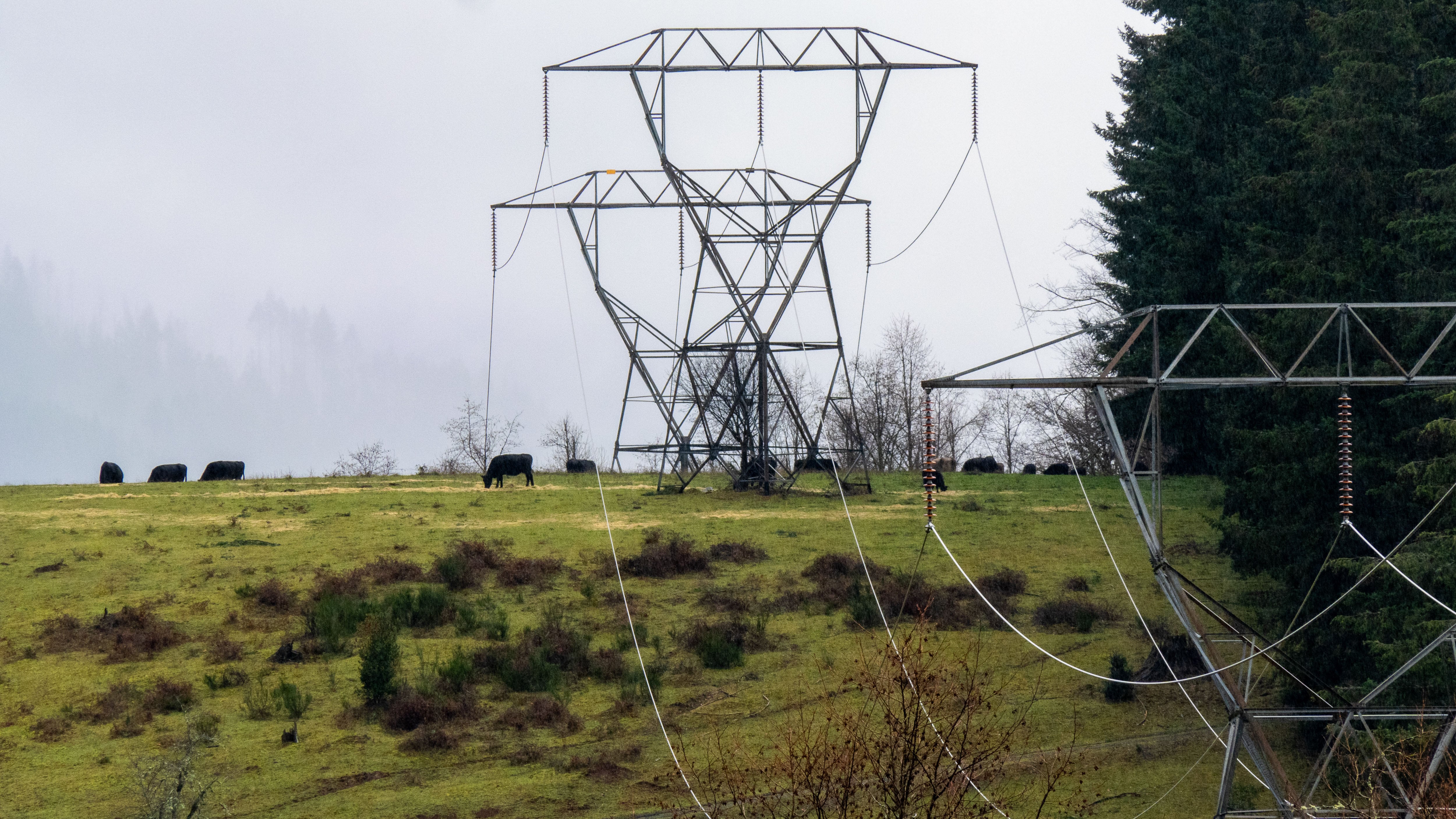This story was produced by the Oregon Journalism Project, a nonprofit newsroom covering the state.
They are words seldom seen in the same paragraph or uttered in the same sentence: Warren Buffett and bankruptcy.
But the self-made multibillionaire Buffett has a big problem with his company’s Portland-based electric utility PacifiCorp.
In a Nov. 3 quarterly earnings statement, the company said it faces a potential “liquidity crisis” stemming from its role in the 2020 Labor Day wildfires. The utility warned that it could be swamped by legal liabilities stemming from the conflagration.
The company made money in the quarter—$1.48 billion to be exact. But it also warned of a looming cash crunch. The leading international ratings agencies—Moody’s and Standard & Poor’s—downgraded PacifiCorp’s bonds earlier this year.
“Should PacifiCorp be downgraded below investment grade and unable to secure sufficient debt financings or alternative funding sources, it may have insufficient liquidity to support ongoing operations,” the utility said in Monday’s earnings report.
The wildfire lawsuits “threaten PacifiCorp’s ability to provide safe and reliable power to its over two million customers in six western states,” the company said in an Aug. 8 filing with the Oregon Court of Appeals.
PacifiCorp declined interview requests for this story. In a statement, it said: “PacifiCorp continues to meet our obligations and provide our customers with an essential service. We are working closely with our regulators in meeting state requirements, while delivering safe and reliable power to the many Oregonians who depend on it every day.”
PacifiCorp offered additional evidence of the financial challenges it faces to the court in the form of a declaration from Nikki Kobliha, PacifiCorp’s chief financial officer. But it also insisted that the so-called Kobliha declaration be wholly redacted.
The court agreed to that request, so the public, including PacifiCorp’s 623,000 Oregon customers, most of them in rural areas, are prevented from reading what Kobliha wrote.
The turbulence has expanded from the balance sheet to the executive suite. On Oct. 4, the company quietly brought on a new CEO. Darin Carroll, a veteran of the Texas energy industry, replaced Cindy Crane, who will remain as PacifiCorp’s board chair.
Residents in the Santiam Canyon, along the Central Oregon Coast, and in Southern Oregon continue to wage legal battles against PacifiCorp, claiming the utility was to blame for the fires that killed nine, burned thousands of buildings, and traumatized others (“After the Inferno,” OJP, Feb. 5).
Trial testimony revealed that senior state officials warned PacifiCorp about the dangerous fire conditions in much of Oregon and urged the company to take appropriate precautions. PacifiCorp declined to turn off its power lines.
PacifiCorp argued that the Santiam Canyon fire was caused not by downed power lines but by airborne embers from other wildfires. The Oregon Department of Forestry came to the same conclusion with its own investigation of the fire. Utility officials said the state report vindicated PacifiCorp.
In 2023, well before that Forestry Department report, a jury in Multnomah County Circuit Court found PacifiCorp had been grossly negligent.
The utility vowed to appeal and, in the meantime, insisted on damages trials for each individual plaintiff.
Jurors have proven overwhelmingly sympathetic to the individual plaintiffs, awarding each an average of $5 million. Even if that average award falls by half, PacifiCorp still could be looking at paying out more than $4 billion.
More than five years have elapsed since the fires. It could be another five years before the damage-phase trials conclude. In hopes of speeding that process, Multnomah County Circuit Judge Steffan Alexander issued a controversial order in July setting out an aggressive timeline for the remaining damages trials.
It is this case management order that PacifiCorp considers an existential threat.
The order proposes to schedule dozens of trials in 2026 and over 100 more in 2027 and 2028, involving approximately 2,000 plaintiffs. Achieving those goals will be difficult, the company said. “The proposed schedule is likely to put significant strain on the Multnomah County Circuit Court system, and PacifiCorp believes this may challenge the court’s ability to fulfill the schedule,” PacifiCorp said in the Nov. 3 earnings report.
It’s also unfair to PacifiCorp and its customers, the company said. Adequately preparing for that large volume of cases would be difficult, if not impossible.
PacifiCorp has already appealed the case to the Oregon Court of Appeals. In September, the company asked the higher court to stay the Multnomah County trials. It explained that proceeding under Case Management Order 11 “threatens PacifiCorp’s ability to provide safe and reliable power to its two million customers in six western states.”
PacifiCorp insisted on filing its motion under seal “because it contains confidential and highly sensitive financial calculations relating to PacifiCorp’s current and future operations.”
On Sept. 23, the court denied PacifiCorp’s request for an order putting the lower court proceeding on hold. And three weeks later, Chief Judge Erin Lagesen of the appeals court denied the utility’s request for reconsideration.
Monday’s earnings statement offers some additional information about the risks PacifiCorp faces. In a civil trial, the winning litigant typically is awarded a legal judgment against their courtroom adversary. If the losing party intends to appeal and doesn’t want to pay anything up front, they can bond the judgment—that is, they can buy a surety bond known as a litigation or appeals bond equal to the damages awarded to their courtroom adversary.
The utility disclosed Monday that it has posted bonds worth $479 million, a sum equal to the cumulative award to the first 91 plaintiffs. That leaves about 2,000 cases still to be heard and about 2,000 additional bonds to post.
If the appeals court sides with PacifiCorp, then all is good for the utility. If, as PacifiCorp puts it, the trials “follow current trends,” then the financial consequences would be dire.
“PacifiCorp estimates damages awarded in the jury verdicts may exceed its available surety bond and letter of credit capacity,” the company said Nov. 3. “Maintaining this trial schedule will cause significant financial strain on PacifiCorp’s liquidity and will put pressure on PacifiCorp’s credit metrics due to bonding requirements. Weakening of PacifiCorp’s credit metrics could result in a downgrade, potentially below investment grade. Such a downgrade may result in the loss of surety bond and letter of credit capacity [and] trigger cash collateral calls.”
The company said it “will have sufficient liquidity to cover its operations and obligations beyond a year.”
In the meantime, PacifiCorp is taking steps to shore up its finances. In September, the company submitted a request to the Oregon Public Utility Commission to allow its holding company, PPW Holdings, to change its capital structure and reduce the minimum equity required by earlier agreement.
Among other things, that rule change could allow the company to take on more leverage while staying in the good graces of state regulators.
Due to the wildfire liabilities, lower projected earnings, and increased long-term debt, the utility said in a filing with the state, “It is expected that PPW Holdings will be more leveraged for the next several years.”
Cody Berne, one of the lead attorneys for the plaintiffs, scoffs at the notion that a company owned by Buffett’s Berkshire Hathaway Energy is short on cash.
“Berkshire is a trillion-dollar corporation with more cash on hand than Oregon’s GDP.,” Berne said. “They have the means to compensate everyone who they hurt.”
As executive director of the Oregon Citizens’ Utility Board in Portland, Bob Jenks has been studying and doing battle with PacifiCorp for decades. He disagrees with Berne and says that PacifiCorp filing bankruptcy, once unthinkable, is not out of the realm of possibility.
“PacifiCorp continues to lose in court,” Jenks says. “And the real problem is that Berkshire Hathaway—PacifiCorp’s parent company—refuses to give PacifiCorp any money. Bankruptcy is a very real possibility here.”

